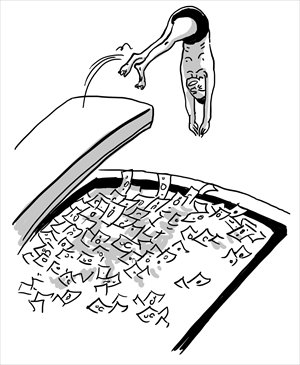Stars dive into trouble, but craze for televised danger will fade in time

The Chinese edition of Stars in Danger, a reality show where celebrities take part in a diving competition, broadcast its third episode on April 28 after temporarily going off the air.
A couple of days ago, the assistant of one of the participants, aged 18, drowned in the pool. It was reported that while all eyes were focused on the star who was preparing to dive from the five-meter platform, nobody noticed the drowning assistant until it was too late.
A source from Jiangsu Broadcasting Corporation, the producer of the show, revealed that the young assistant's drowning was a result of his foolishly diving by himself. The case is still being investigated.
Since April, two diving reality shows, the Chinese edition of Stars in Danger and its rival the Chinese edition of Global hit, have been embroiled in a swirl of public opinion.
They both harvested relatively high ratings. But meanwhile, they have been also overwhelmed with controversy due to security concerns even before the drowning case.
More than one celebrity was seen fainting after they jumped from the high platform, including pop singer Han Geng and Niu Qun, a 64-year-old crosstalk comedian. Nearly all of the participants get various physical injuries like perforated ear drums or fractured ribs.
"Ask stars to jump from buildings, then you'll get a higher rating!" famous Hong Kong actor Anthony Wong Chau-sang wrote on his Weibo account. Many others have also articulated their loathing against the shows playing games with people's lives.
The production teams offered the defense that they are making a program advocating the spirit of challenging limits and popularizing diving, but the facts don't seem to bear this up.
The audience screamed more for the six-pack stomachs of male star divers and the clinging swimsuits of female participants than the clumsy diving. They care more about whether those stars who face allegations of face-lifts or body-reshaping will participate in the driving, since at a very early stage, the show boasted that stars who had undergone cosmetic surgery would be rejected, otherwise the strong impetus of rushing into the water could twist their faces or rupture the silicone of breast implants.
The accidents, especially the drowning, have made the programs a target of criticism. Diving risks being demonized as a result. The sport greatly boosted the sense of national pride, with China ranking top on the gold medal list in various international diving competitions and at the Olympic Games. But now, it's viewed as hazardous and threatening.
Whether star power is enough to draw fans to diving is also in question. Those obsessed with superstars may fanatically collect everything related to their idols, chase them all over the country, and imitate the way they dress and speak. But surely they don't want to see their beloved starts afraid or hurt.
Chinese audience's initial zeal on such kind of programs is based on the instincts of hunting for novelty. They will finally not go for those shows that use stars in unsafe stunts.
I am a fan of Taiwanese talk shows. I was quite impressed by one episode when some Taiwanese entertainers, actors and singers were invited to recall those adventurous programs they attended before.
Crushing stones on the chest of pop stars or diving from five or 10 meter springboards might have advanced ratings, but all those involved called them "miserable" and "punitive" memories and they claimed they never want to do them again. In fact, those programs have gradually disappeared since the initial craze faded.
Using controversies to attract attention degrades TV. The best way for those who criticized such vulgar programs most loudly is actually to press the channel button on the remote control.
The author is a reporter with the Global Times. yujincui@globaltimes.com.cn